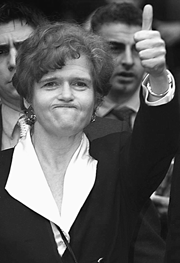Shoah
Museum in Turmoil Over Bid To Oust ChiefGreenberg Foes Say
It's About Rich Tiff; Allies See Politics,
Power
By STEPHEN SCHWARTZ,
FORWARD STAFF
WASHINGTON - The chairman of the
United States Holocaust Memorial Museum, Rabbi Irving
"Yitz" Greenberg, was fighting for his reputation and
his public life this week after a group of members of the
museum's governing council demanded that he step down
over his role in the Marc Rich pardon
affair.
The resignation demand was presented in a letter,
signed by 17 current and former council members, that was
hand-delivered to Rabbi Greenberg at a Detroit airport
three days before Passover. The move prompted a
counter-attack by his supporters, who gathered signatures
from 35 members of the 65-member council on a letter
urging Rabbi Greenberg to stay on.
In gathering signatures, both sides said they had
deliberately refrained from approaching the council's 10
sitting members of Congress, suggesting that the
council's 55 non-congressional members are divided
roughly two-to-one in Rabbi Greenberg's favor.
While on the surface the affair appears to represent
just the latest twist in the continuing fallout of the
Rich pardon scandal, Rabbi Greenberg's supporters insist
that his opponents had ulterior motives. Among them, his
supporters said, were Beltway partisanship, conflicts
over Rabbi Greenberg's leadership style and longstanding
disputes over the museum's identity and message.
In particular, they pointed to a debate within the
museum's staff and lay leadership over the museum's
obligation to address Jewish sensibilities, which Rabbi
Greenberg has championed. His stance reportedly has
aroused resentment among some senior museum staffers who
see the museum first and foremost as an American
institution, with less responsibility to address Jewish
themes.
A similar debate led to the dismissal in 1993 of a
previous chairman, Harvey Meyerhoff, a Republican
appointee, by President Clinton, after Mr. Meyerhoff
refused to invite Israel's then-president Chaim Herzog to
address the museum's opening ceremonies, claiming it
would detract from the museum's identity as an American
institution. Mr. Meyerhoff is said to be one of the main
organizers of the move to unseat Rabbi Greenberg, who was
appointed by Mr. Clinton a year ago.
"The museum and its critics may be a mirror for some
of the divisions in the contemporary Jewish experience,"
said one prominent Greenberg backer, former museum
research director Michael Berenbaum.
Rabbi Greenberg's opponents said in their letter that
he had "entangled the Museum in a political controversy
inimical to its mission" when he wrote to President
Clinton last year on museum stationery to urge a pardon
for Mr. Rich, the controversial fugitive tax-cheat.
 "Your
action has diminished the stature and reputation of the
Museum, and this damage cannot be repaired while you
continue to serve as its Chairman," the letter said.
Signers included Mr. Meyerhoff, Catholic Holocaust
scholar Rev. John
Pawlikowski, former Massachusetts first lady Kitty
Dukakis and Prof. Deborah Lipstadt of Emory
University (left), who
recently won a celebrated British libel case against
Holocaust denier David Irving.
"Your
action has diminished the stature and reputation of the
Museum, and this damage cannot be repaired while you
continue to serve as its Chairman," the letter said.
Signers included Mr. Meyerhoff, Catholic Holocaust
scholar Rev. John
Pawlikowski, former Massachusetts first lady Kitty
Dukakis and Prof. Deborah Lipstadt of Emory
University (left), who
recently won a celebrated British libel case against
Holocaust denier David Irving.
The counter-letter from Rabbi Greenberg's supporters
blasted his opponents' initiative as "unfair," noting
that he had "apologized for his mistake" at a January
meeting of the council, and that the apology was
"accepted by both the Executive Committee and the full
Council" in majority votes. Signers included the founding
museum council chairman, Elie Wiesel,
(right), as well as the
former White House special representative for Holocaust
matters, Stuart Eizenstat, and the chairman of the
American Gathering of Jewish Holocaust Survivors,
Benjamin Meed.
 In
interviews, Rabbi Greenberg's supporters reacted angrily
to his opponents' letter, noting that it came three days
before the Passover holiday and just two weeks before
President Bush is scheduled to make his first
appearance at the Days of Remembrance, the federal
government Holocaust memorial ceremony held in the
Capitol Rotunda every April 19, timing that some said
seemed designed to maximize Rabbi Greenberg's public
humiliation.
In
interviews, Rabbi Greenberg's supporters reacted angrily
to his opponents' letter, noting that it came three days
before the Passover holiday and just two weeks before
President Bush is scheduled to make his first
appearance at the Days of Remembrance, the federal
government Holocaust memorial ceremony held in the
Capitol Rotunda every April 19, timing that some said
seemed designed to maximize Rabbi Greenberg's public
humiliation.
Several Greenberg supporters
pointed angrily to what they said were his opponents'
ulterior motives beyond the Rich affair, which they
insisted had been settled when the council accepted
his apology.
A key factor, several sources maintained, was tension
between Rabbi Greenberg and the museum's executive
director, Sara Bloomfield. Several signers of the
resignation demand are known as allies of Ms. Bloomfield.
The tension is said to stem from a combination of
friction over Rabbi Greenberg's management style, which
numerous sources have characterized as "difficult," and
philosophical disagreements over the museum's
identity.
"Yitz believes that the Shoah is becoming what the
Exodus was, a particular Jewish story that is made into a
universal symbol in order to strengthen conscience and
human dignity," said one Greenberg ally, speaking on
condition of anonymity. "Up till now the survivors have
carried that message, but as they pass on, he believes
the museum has to institutionalize it, which requires
staff that is sensitive to the Jewish experience.
Some of the existing staff hears
the words and believes he wants to hire only Jewish
staff, which they object to. It's a continuing
misunderstanding."
Another key factor, several Greenberg supporters
insisted, was a desire for revenge by Mr. Meyerhoff,
after his 1993 dismissal under similarly humiliating
circumstances on the eve of the museum's grand
opening.
It was Mr. Meyerhoff who hand-delivered the
resignation ultimatum to Rabbi Greenberg at the Detroit
airport on April 4. Several sources said Mr. Meyerhoff
had contacted Rabbi Greenberg's office the day before and
asked that he call back on Mr. Meyerhoff's cellular
phone. When Rabbi Greenberg returned the call on the
morning of April 4, he found Mr. Meyerhoff at a Detroit
hotel, where he had come in an apparent attempt to
surprise Rabbi Greenberg. The two arranged to meet at the
airport where Rabbi Greenberg was scheduled to depart for
another engagement. There, Mr. Meyerhoff reportedly asked
Rabbi Greenberg to resign on the spot.
Mr. Meyerhoff's dismissal from the chairmanship has
remained controversial for years. Sources familiar with
the events say the confrontation arose over a request by
Holocaust survivors on the museum council that Israeli
president Herzog be invited to address the
museum's opening ceremonies. Mr. Meyerhoff, appointed to
the chairmanship in 1987 by President Ronald
Reagan, reportedly opposed Herzog's participation as
inappropriate for an American institution. Mr. Meyerhoff
refused to bend even after direct intervention by
President Clinton, prompting Mr. Clinton to remove him
from the post. Mr. Meyerhoff is said to have been
particularly incensed that the matter was leaked to the
press, embarrassing him on the eve of the opening of the
museum he had worked for years to build.
Mr. Meyerhoff's supporters have insisted ever since
that the dismissal was a nakedly partisan move by Mr.
Clinton to remove a Republican from what should have been
a nonpartisan post.
In discussing this week's controversy, however, Rabbi
Greenberg's opponents stuck to their position that the
pardon of Mr. Rich was their only motivation in demanding
the resignation. Rabbi Greenberg "has totally embarrassed
the museum," said former council vice-chairman William
Lowenberg, a Republican businessman from California.
"I have known him more than 25 years and I was devastated
to see him taking this position in defense of this thief,
Rich. Using the museum's stationery for that was
unacceptable. I have heard from many donors, they're very
angry and I'm angry. It was unforgivable."
But the supporters of Rabbi Greenberg assailed his
critics' tactics as "premeditated malice," in the words
of one supporter, attorney Menachem
Rosensaft, a member of the museum's executive
committee and chair of its committee on government.
"The letter's signatories have forfeited the moral
high ground by the way they have operated," Mr. Rosensaft
said. "The critics could have asked for a special meeting
of the council to discuss this but instead they put it
out in [public] ....There is no justification for
engaging in this kind of stealth terrorist attack in the
context of an institution that is supposed to represent
an ethical dimension in human interaction."
Mr. Berenbaum, however, was philosophical about the
dispute. "The periodical struggles and bloodletting in
the museum may be a result of the fact that it's dealing
with such a horrific event - the horror of the event and
the evil of the event spill back on the people that work
with it," he said.